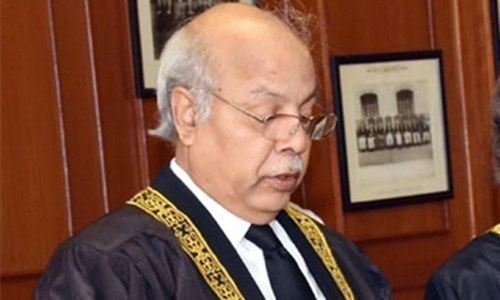ISLAMABAD: The Supreme Court has held that police personnel should be upright and have an unimpeachable character, as well as clean antecedents, since the job demands accountability at every step and places a tremendous responsibility on them.
The observation came in a judgement authored by Justice Muhammad Ali Mazhar on an appeal against a decision by the Punjab Services Tribunal which rejected a plea by an assistant sub-inspector of police on Sept 22, 2020.
The Supreme Court bench comprised Chief Justice of Pakistan (CJP) Umar Ata Bandial, Justice Sajjad Ali Shah and Justice Muhammad Ali Mazhar.
Faraz Naveed was appointed as assistant sub-inspector through the Punjab Public Service Commission.
He was charged with murdering Tufail Haider Naqvi at a police station in Gujrat in Nov 2014 after keeping him in illegal confinement.
He was indicted under Section 302 PPC and the Anti-Terrorist Act (ATA), read with Article 155-C of the Police Order, 2002.
On Nov 5, 2014, the petitioner along with other police officials Thereafter, the petitioner murdered him with a hatchet in a room within the premises of the police station.
An anti-terrorist court (ATC) awarded Faraz Naveed the death sentence under Section 302 PPC and Section 7 of the Anti-Terrorist Act. He was also sentenced to three years in jail under Article 16 (d) of the Police Order 2002. The ASI then took his appeal to the Punjab Services Tribunal (PST), but it found the petitioner guilty and recommended departmental action against him.
Faraz Naveed was later dismissed from service.
He challenged his conviction in the Lahore High Court, which acquitted the petitioner by giving him the benefit of doubt.
While he was in jail, he was served a show cause notice on Nov 8, 2014, and dismissed from service on Jan 10, 2015, after departmental inquiry.
But after he was acquitted, the petitioner filed a departmental appeal, but it was rejected. He then filed an appeal with the Punjab Service Tribunal, but it too dismissed the plea on Sept 22, 2020.
Justice Muhammad Ali Mazhar of the Supreme Court observed in the judgement that despite acquittal, it was the prerogative of Faraz Naveed’s employer, the Punjab Police, to reinstate or disregard his request for reinstatement.
It is for the department to examine equitably whether the petitioner has been completely exonerated or not and to satisfy itself that his reinduction would not become a threat to discipline in the police force.
A person having criminal antecedents would not be fit to be reinstated to his previous position, the judgement observed.
It further said the apex court did not find any illegality or perversity in the dismissal order. Therefore, the present petition is refused, the verdict explained.
The benefit of doubt, as of right, should be given to an accused when there is an equal possibility of the accused being guilty or not guilty, the Supreme Court said.
Two interpretations
The benefit of doubt, according to the judgement, can be extended to an accused only if the facts and circumstances of the prosecution case were susceptible and amenable to two interpretations, one in favour of the prosecution and the other in support of the accused,
But an employer, while considering the issue of reinstatement as aftermath of acquittal of an already dismissed employee, will have the unbridled right and authority to dwell on and appraise the antecedent and fitness of the employee, the judgement said.
In the absence of any provision in the service rules for reinstatement, if an employee is honourably acquitted by a court, no right is conferred on the employee to claim any benefit, including that of reinstatement.
The reason is that the standard of proof required for holding a person guilty by a criminal court and the inquiry conducted by way of disciplinary proceeding is entirely different.
The rationale of initiating disciplinary proceedings by the employer is to see whether the charges of misconduct levelled against the delinquent are proved or not and in case his guilt is proved, what action should be taken against him, the judgement explained.
It is a settled exposition of law that the prosecution, in criminal cases as well as in a departmental inquiry on the same allegation, can be conducted and continued concurrently at both venues without having any overriding or overlapping effect.
The object of a criminal trial is to award punishment of the offences committed by the accused while the departmental inquiry is initiated to investigate allegations of misconduct, the judgement said.
In the departmental inquiry, the standard of proof is that of “balance of probabilities or preponderance of evidence”, but not “proof beyond reasonable doubt” – a strict proof required in a criminal trial because the potential penalties are severe, the verdict explained.
Published in Dawn, August 9th, 2022













































Dear visitor, the comments section is undergoing an overhaul and will return soon.